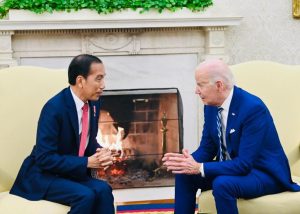Indonesia’s President Joko “Jokowi” Widodo urged Joe Biden to “do more” to stop Israel’s ruthless assaults on the Gaza Strip, as the two leaders met in Washington and announced a major upgrade to their bilateral relationship.
Biden welcomed the Indonesian leader to the White House yesterday, in a bid to strengthen trade and defense ties between the two nations ahead of this week’s APEC Summit in San Francisco, and his expected meeting with Chinese leader Xi Jinping.
In a statement yesterday, the White House stated that the two leaders had agreed to elevate U.S.-Indonesia ties to a Comprehensive Strategic Partnership, “marking a historic new phase in our bilateral relations.”
They also agreed to expand cooperation in areas including cybersecurity, maritime security, and defense cooperation writ large, the White House said. They also agreed on joint efforts to support Indonesia’s electrical grid and improve air quality in Southeast Asia, among other climate-related commitments.
As expected, however, it was hard to avoid the wide gulf in the two nations’ policies toward the Israel-Hamas war, and Jokowi used his opening remarks in the Oval Office to push back against Biden’s resolute support of Israel.
“Indonesia appeals to the U.S. to do more to stop the atrocities in Gaza,” Jokowi told Biden. He said that a ceasefire “is a must for the sake of humanity.”
The fact that Jokowi spoke out is unsurprising, given Indonesia’s long-time support for the Palestinian cause, which the country’s leaders connect to their own struggle against Dutch colonial rule. Indeed, the broad domestic support for Palestine made it nothing short of a political necessity for Jokowi to take a public stand on the issue, especially given the fact that he is the first leader of a Muslim-majority country to meet with Biden since the beginning of the conflict on October 7.
Indonesia has also long supported the population of the Gaza Strip, and in 2011 built a hospital in Beit Lahia in north Gaza from money donated by the public. The Indonesia Hospital has been overrun with patients wounded by Israel’s bombardment. Its doctors are also struggling with depleting medical stock and frequent blackouts.
The Biden administration would no doubt have preferred discussions to stick to other areas of mutual interest. National Security Council Advisor Jake Sullivan said ahead of the meeting that the two leaders’ positions on the conflict in Gaza were “well known” and that they would also have the opportunity to focus on the diplomatic upgrade and on making “tangible progress on issues like critical minerals, like clean energy cooperation, and like investment.”
While “Comprehensive Strategic Partnership” is the same phrase that accompanied the upgrade of U.S. relations with Vietnam in September, the Indonesia case is less substantial. The agreements provide for partnerships “to create a more resilient, secure, and sustainable global semiconductor value chain,” as per the White House statement. They also said that they “intend to sign a new Defense Cooperation Arrangement that broadens and deepens cooperation” in a range of areas, including defense professionalization, combined exercises, and cybersecurity.
However, as one observer noted, a lot of the agreements are prospective, and involve the creation of regulations, the development of plans, and the conduct of feasibility studies.
In a post on X (formerly Twitter), Evan A. Laksmana of the International Institute for Strategic Studies characterized the agreements as “less than groundbreaking as some might hope, but with more potential to expand and institutionalize the breadth of the relationship and deepen some aspects (like defense) down the line.”
The most obvious omission was any sort of substantial agreement on critical minerals, though there are significant obstacles to closer U.S.-Indonesia cooperation in this sector. On Sunday, Reuters reported that the two governments were working to advance a potential minerals partnership focused on nickel, a key component of electric vehicle batteries that Indonesia possesses in abundance. Citing three people with direct knowledge of the conversations, the news agency reported that Jokowi and Biden would discuss the “next steps that could move the countries toward formal negotiations on the partnership.”
The report stated that the main sticking point from the U.S. side is the parlous state of environmental, social and governance standards in Indonesia’s nickel mining and processing industry. Given this reality, U.S. officials are examining how a deal might work, said the sources, one of which added that the Biden administration also plans further consultations with U.S. lawmakers and labor groups in the coming weeks.
“There’s a lot of work to do before we are able to formally announce negotiations on a critical minerals partnership,” the source told Reuters.
































